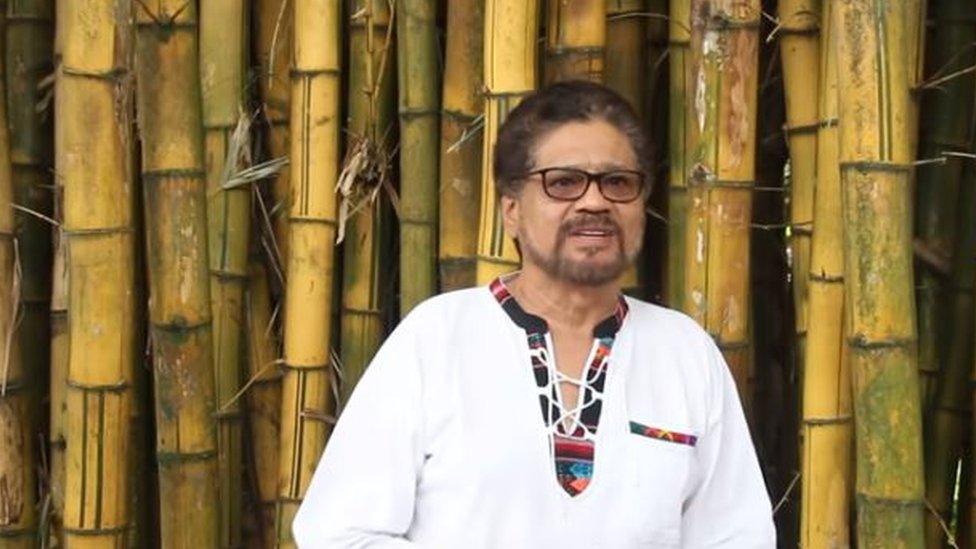Colombia ex-Farc rebel Iván Márquez issues call to arms
- Published
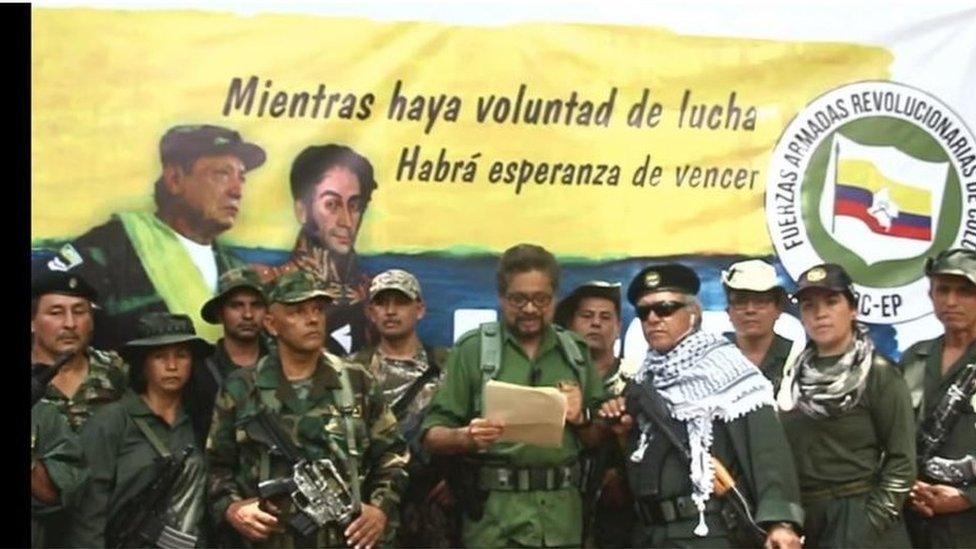
The video shows Iván Márquez reading out his call to arms
A former commander in the Farc rebel group in Colombia, Iván Márquez, has called on his followers to take up arms less than three years after the rebels signed a peace agreement with the government.
Iván Márquez appeared in a video and announced that a "new phase of the armed struggle" was beginning.
He was one of the main negotiators of the peace deal in 2016.
The Colombian government said it was "a very worrying announcement".
What does the video show?
It shows Iván Márquez reading out a statement in front of a banner saying "While there is a will to fight, there'll be hope of winning".
He is surrounded by about a dozen men and women dressed in camouflage. Among them are two other senior former Farc rebels, Jesús Santrich, and the man known as El Paisa.
In his 30-minute-long statement, Iván Márquez says that he called for a return to arms because the Colombian state had "betrayed" the peace agreement he helped negotiate.

The Farc's decades-long armed struggle

1964: Set up as armed wing of Communist Party
2002: At its height, it has an army of 20,000 fighters controlling up to a third of the country
2008: The Farc suffers a series of defeats in its worst year
2012: Start of peace talks in Havana
2016: Peace deal signed in November
2017: Farc officially ceases to be an armed group
2019: Former commander Iván Márquez announces "a new phase of the armed struggle"

"In two years, more than 500 social leaders have been killed and 150 guerrilla fighters are dead amidst the indifference and the indolence of the state," Iván Márquez says, referring to the high number of activists and former Farc members killed since President Iván Duque took up office.
In the recording, he also says that the new guerrilla group, which carries the old name, Farc-EP (Revolutionary Armed Forces of Colombia - People's Army), will pursue different tactics.
He says that the group will only "respond to offensives" and that they will not carry out kidnappings for ransom but instead "seek dialogue" with local landowners and business people to try and convince them to "contribute" to their cause.
The video ends with Jesús Santrich shouting "Long live the Farc-EP!"
Who is Iván Márquez?
Iván Márquez is the nom-de guerre of Luciano Marín Arango. He was the number two in the Farc rebel movement before the guerrilla group signed a peace deal with the Colombian government in 2016, after more than five decades of armed conflict.
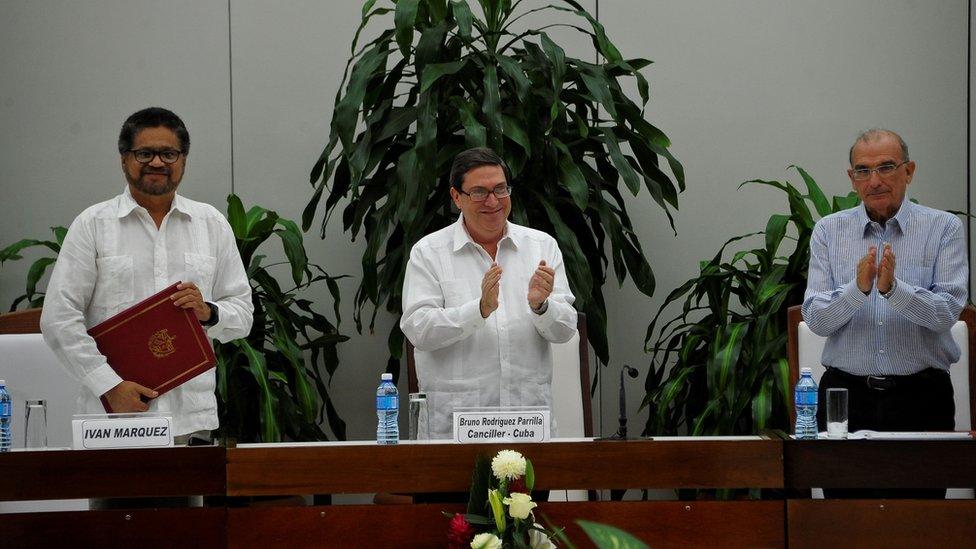
Iván Márquez (left) was the main negotiator for the Farc and signed the peace deal in November 2016
He was a key figure in the peace negotiation which led to the signing of a peace deal in November 2016, leading the Farc negotiating team for the four years the talks lasted.
As part of the peace process, the Farc turned into a political party and was assigned a number of seats in Colombia's congress.
Iván Márquez was assigned one of the Farc's five seats in the senate. But days before he was due to take up his post in July 2018, he announced he would not do so in protest at the arrest of his Farc comrade, Jesús Santrich.
He went into hiding shortly afterwards and his only public appearance was in a video released in January.
In that video, he accused the Colombian government of failing to implement the agreements reached with the Farc and said he felt "disheartened". But at the time, he said he was still committed to peace.

Call to arms not a complete surprise
Will Grant, BBC News
A little before Christmas 2015, I sat down in Havana with Iván Márquez. One of the top Farc commanders and a chief negotiator in the peace process with the Colombian Government, he repeated his firm conviction that the decades of violence had been worth it to bring Colombia to the brink of peace.
"If we hadn't been here to fight for what we believe in, who knows what would have happened to Colombia. Probably the complete looting of our natural resources," he told me.
I remember, though, that he also expressed concern that the Colombian government would be true to its word. If necessary, he said, he would always be ready to pick up arms again. It was a sentiment echoed by almost all the Farc guerrillas I met in Cuba at that time and on a subsequent visit to one of their jungle camps in Colombia.
Considered an ideologue, even by the radical standards of the Farc, it doesn't come as an entire surprise that Iván Márquez is now the one to issue the rallying cry to the guerrillas to return to the jungle. He had often said that the commitment to the peace deal was real but conditional on the Colombia government sticking rigidly to the terms of the deal.
From his perspective - one of a life spent in near-constant conflict - they have broken that binding pact. So in return, he has broken with civilian life and picked up the gun once more. For Colombia, the omens of that decision are profoundly worrying.

How significant is the new video?
It has been clear since he gave up his senate seat and went into hiding last year that Iván Márquez's commitment to the peace deal was wavering.
The same applies to Jesús Santrich, a former Farc rebel turned Congressman who failed to show up to court over drug smuggling charges in July.
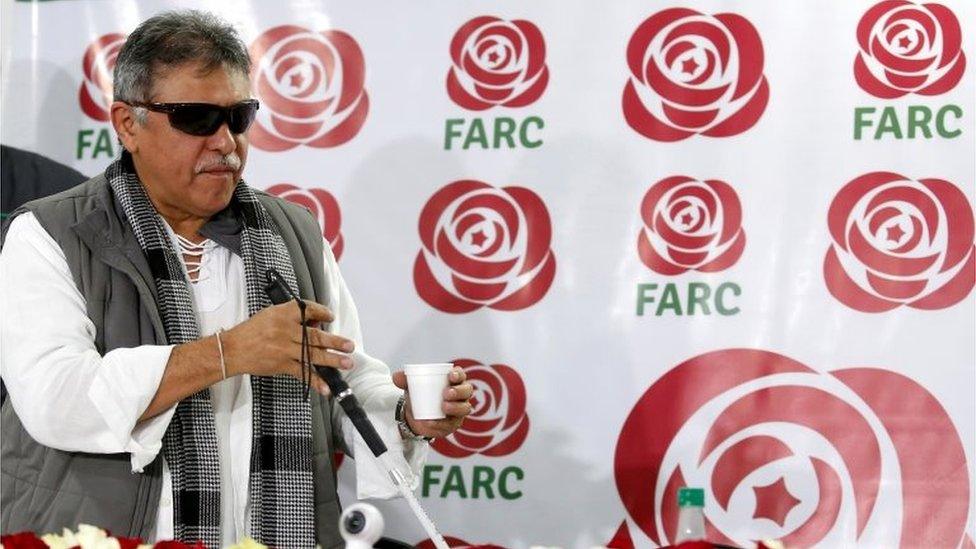
Jesús Santrich was briefly a Congressman representing the Farc political party before he was arrested and later released
However, their announcement of a "new phase in the armed conflict" is much more dangerous than their previous "disillusionment" with the implementation of the peace process.
It is also likely to increase criticism of the transitional justice system created as part of the peace deal.
Those who have warned that the Farc could not be trusted and that their leaders should have been jailed will feel vindicated.
Is the Farc back now?
Many would argue it has never completely gone away. While the group's leaders signed a peace deal and almost 7,000 of their fighters handed in their weapons, there have been groups of dissidents which never stood down.
The BBC's Will Grant gained access to a Farc camp in Western Colombia
The number of dissidents is hard to estimate, but the figure cited in a leaked military document earlier this year was 2,300.
Some of these dissidents never laid down their weapons, others have returned and yet others are new recruits. But so far, they have been scattered around the country in dozens of small groups.
Tuesday's video showing three former influential commanders could be a sign that these groups are joining forces and will again act as one rebel group.
What has the reaction been?
In response, the Colombian government's peace commissioner Miguel Ceballos told Colombia's Blu Radio: "There is no surprise for the national government. Unfortunately, these people had already made clear, by their behaviour, that they turned their backs on the peace accord."
The Farc's former top commander, Rodrigo Londoño, who used to be Iván Márquez's boss before the group disarmed, said that the "great majority" of former guerrilla fighters remained committed to peace "despite all the difficulties and dangers". Rodrigo Londoño now leads the political party which formed after the Farc laid down arms.
Former president Álvaro Uribe, who has all along been one of the most outspoken critics of the peace deal, slammed the peace accord saying that "the country must be aware that there was no process of peace, but [there was] a pardon for some people responsible for atrocious crimes at a high institutional cost".
Humberto de la Calle, one of the chief negotiators on the government's side, called on "all Colombians to shield and protect the peace process". "We recognise that the vast majority of men and women of the Farc have complied with the agreement; and we invite them to continue with its process of reincorporation into civilian life that will pay off every day," he added.

You may also be interested in:
Former Farc rebels become eco-warriors to stop deforestation in the Amazon
- Published10 July 2019
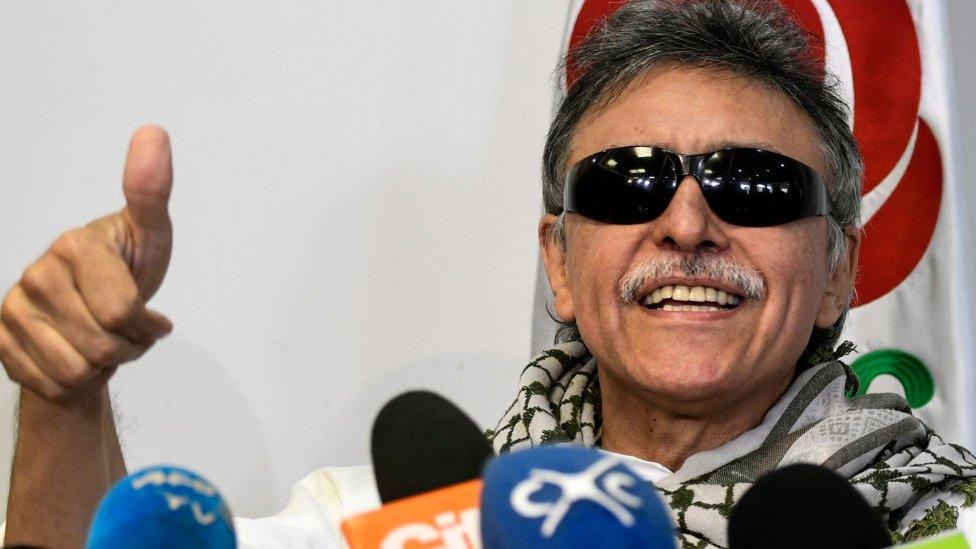
- Published3 July 2019
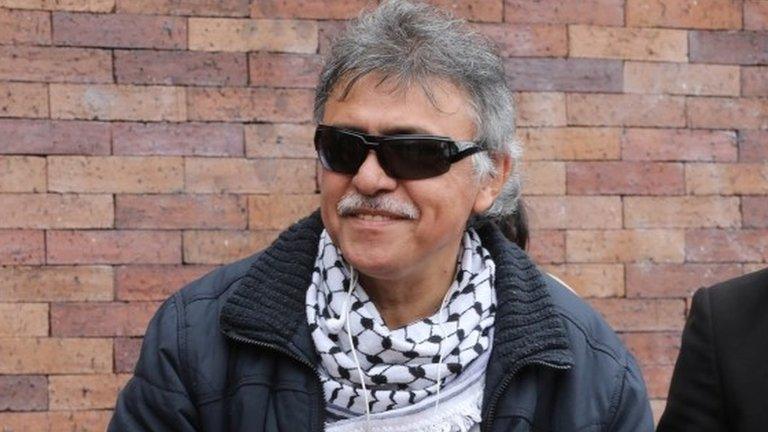
- Published19 June 2019
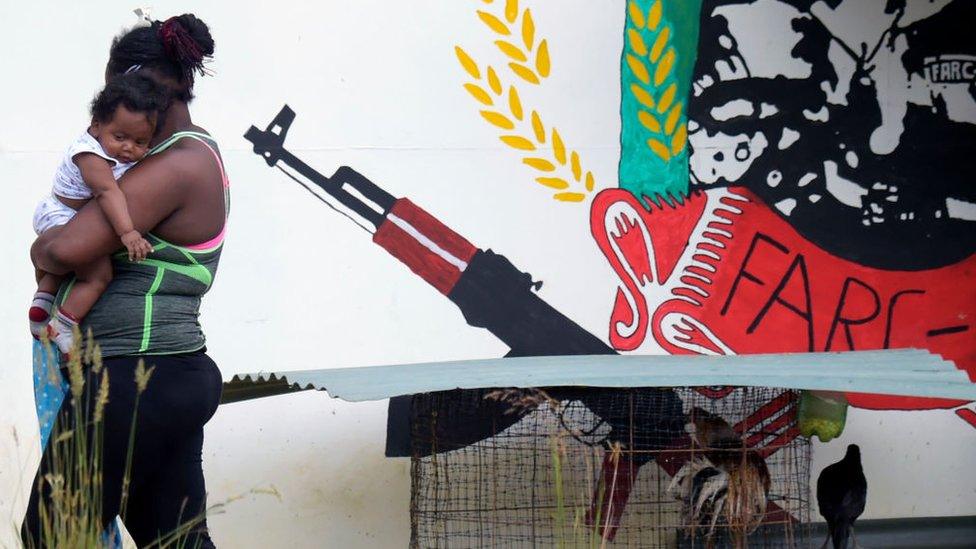
- Published3 February 2019
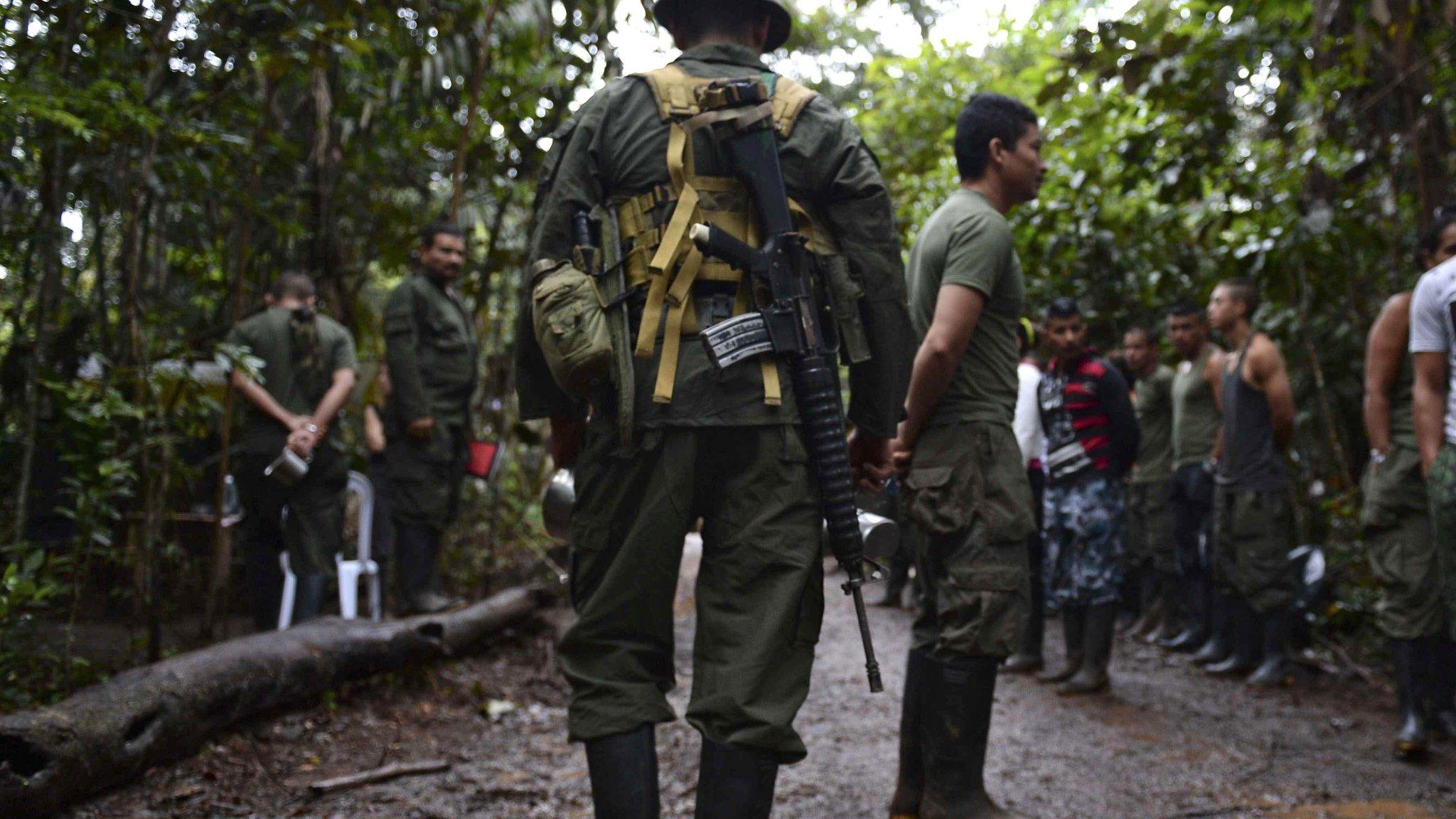
- Published13 January 2019
